Bupropion and Erectile Dysfunction: Is There a Risk?
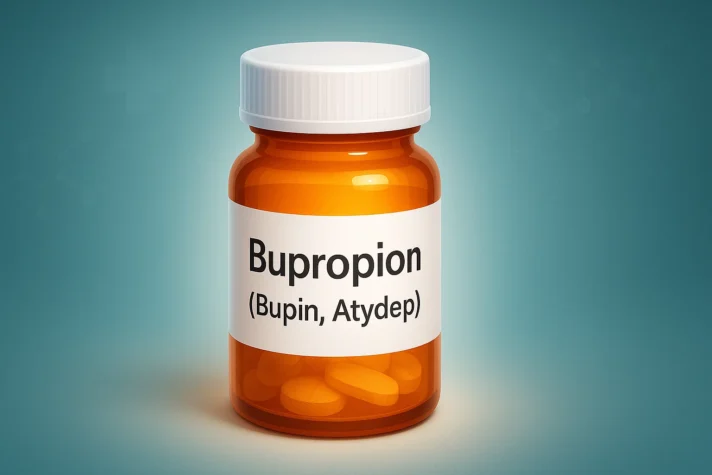
No, bupropion is unlikely to cause erectile dysfunction (ED) and may even improve sexual function in some men, especially when compared to other antidepressants like SSRIs. An antidepressant also used for smoking cessation, may, unlike many antidepressants, bupropion doesn’t affect serotonin but instead increases dopamine and norepinephrine, two brain chemicals that influence sexual desire and function. Research suggests it may improve libido, erections, and orgasm quality in some men. Though not officially approved for ED treatment, it’s often well tolerated and can be a helpful option for those with mental health-related ED. Always consult a doctor to find the most effective and safe approach.
Erectile dysfunction (ED) is a common problem that many men face around the world. While there are several good treatments available, some men develop ED because of certain medications or health and mental health issues. Because of this, more people are interested in alternative treatments. Bupropion is a medicine usually used to treat depression and help people stop smoking.
In this article, we’ll answer the question: Does bupropion help with erectile dysfunction? We’ll explain how this medicine works, what research says about its effects on sexual health, and how it compares to other ED treatments. If you or someone you know is looking for treatment options, this article will give you clear and trustworthy information.
What Is Bupropion? Understanding the Medication
Bupropion is a prescription antidepressant medication used to treat depression, seasonal affective disorder and to help people quit smoking. It’s sold under brand names like Bupin, Atydep, Wellbutrin, and Zyban.
It is not like many antidepressants that increase serotonin. Serotonin [1] is a neurotransmitter that helps regulate mood, sleep, appetite, digestion, and other bodily functions.
Bupropion works by increasing the levels of two key neurotransmitters in the brain:
- Dopamine[2]
- Norepinephrine[3]
These chemicals play vital roles in regulating mood, motivation, energy, and sexual function.
Dopamine is a “feel-good” chemical that plays a big role in motivation, pleasure, and sexual desire, while norepinephrine helps with alertness and energy.
“If your ED is linked to depression or the side effects of other medications, bupropion can be a helpful option that addresses both issues at once.”
Because bupropion works differently from common antidepressants like SSRIs(Selective Serotonin reuptake inhibitors), it is less likely to cause sexual side effects such as erectile dysfunction.
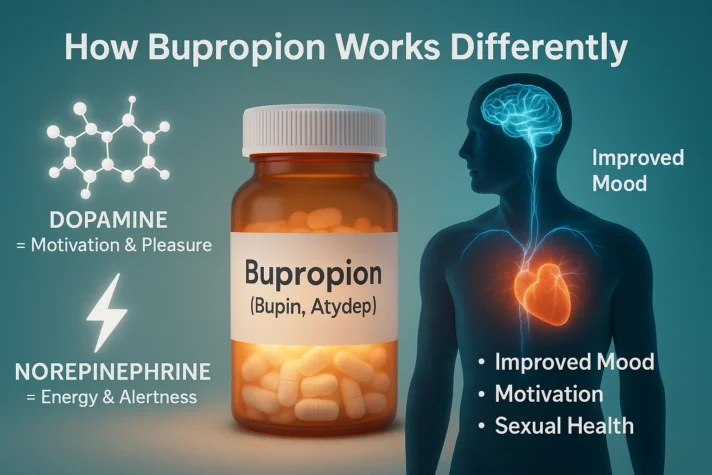
How Might Bupropion Help with Erectile Dysfunction?
Sexual arousal and erectile function are influenced by the brain’s reward and motivation systems.
Dopamine is the centre of these processes:
- Dopamine stimulates sexual desire (libido) and sexual response
- It enhances the brain signals (neural) necessary to achieve and maintain an erection
- The chemical from the brain and nervous system (neurotransmitter system), involving dopamine, affects both psychological and physical aspects of sexual function
Bupropion increases dopamine and norepinephrine activity. This may help restore sexual desire. It may also improve erectile function. These changes create positive effects on sexual response.
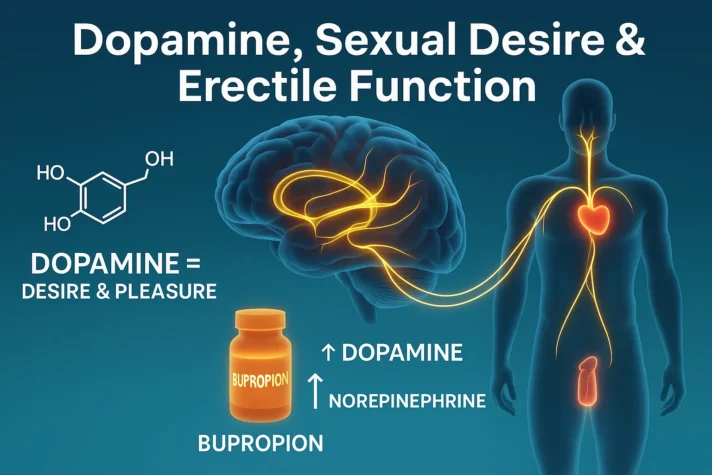
Why Bupropion Is Different from Other Antidepressants
Many antidepressants increase serotonin. This can reduce sexual function. It can cause side effects like low sexual desire, delayed ejaculation, or trouble reaching orgasm.
Bupropion’s lack of serotonergic activity makes it less likely to cause these issues. Serotonergic refers to anything related to serotonin, which is a chemical (neurotransmitter) in the brain that helps regulate mood, sleep, appetite, and other functions.
In some cases, it can even reverse sexual dysfunction caused by other antidepressants, providing a clinical response that addresses both mental health concerns and sexual function.
Bupropion may improve sexual desire, erections, and orgasm. This is especially true for people with depression or those taking antidepressants. A 2018 study in patients with schizophrenia showed clear benefits and no major side effects. Bupropion also helps reduce sexual side effects caused by SSRIs.[4]
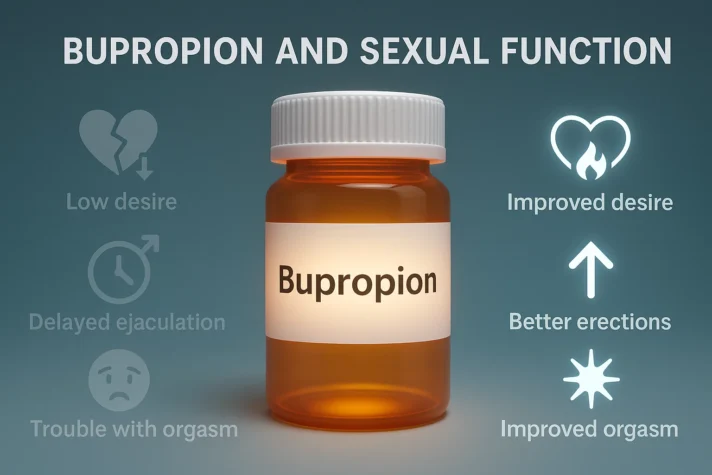
Bupropion’s Effects on Different Sexual Function Components
Sexual Function Component |
Effect of Bupropion |
Notes |
Sexual Desire (Libido) |
Generally improved | Linked to increased dopamine activity |
Erection |
Improved in many cases | May enhance neural and blood flow function |
Orgasm |
Often improved | Increased satisfaction; may aid orgasmic dysfunction |
Sexual Arousal |
Mixed results | Some patients report little or no change |
Ejaculation |
Variable | May help with premature ejaculation; effects vary |
Treatment Pathway: How Bupropion May Help with Erectile Dysfunction
Doctors should check for physical, psychological, or medication causes of erectile dysfunction. If erectile dysfunction is linked to depression, seasonal affective disorder, or antidepressant side effects, they should consider sustained-release bupropion.
Sustained-release bupropion [5], often called bupropion SR, releases slowly into the body. This allows people to take it twice a day instead of more often.
Monitor for improvements in:
- Libido and sexual response
- Erectile function
- Orgasm quality
- Overall arousal
Adjust treatment as needed, and consider combination therapy or psychological support if appropriate.
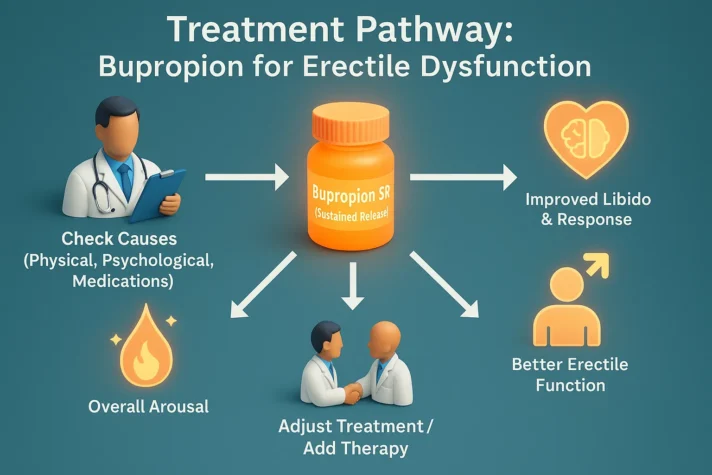
Is Bupropion a Suitable Treatment for Erectile Dysfunction?
Advantages of Using Bupropion for ED
1. Lower risk of sexual side effects
This antidepressant rarely causes decreased libido (sexual desire) or ED
2. Mental Health and Sexual Function
It can improve both mental health and sexual function in depressed or psychiatric patients
3. Well-tolerated medication
Most patients tolerate 150–300 mg/day doses of sustained-release bupropion well
4. No cardiovascular side effects
This is important for men with heart disease, unlike some phosphodiesterase inhibitors
5. Addresses multiple conditions
Can help with seasonal affective disorder, attention deficit hyperactivity disorder, and smoking cessation
Limitations and Considerations
1. Off-label use
Bupropion is not officially approved for ED treatment; its use for this purpose is based on off-label clinical experience
2. Not a universal solution
Some aspects of sexual function, like ejaculation and sexual arousal, may not improve
3. Side effects
Insomnia, dry mouth, and in rare cases, seizures or psychiatric symptoms can occur
4. Medical supervision required
Especially important for patients with a history of seizures or bipolar disorder
5. Individual variation
Clinical response may vary based on underlying causes and individual neurotransmitter system function
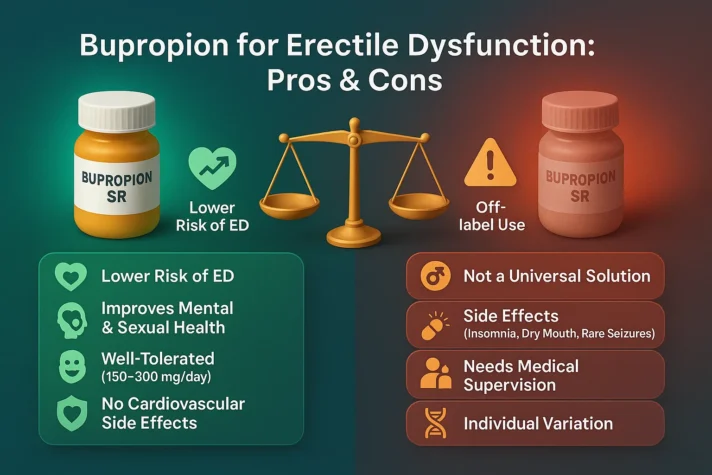
How Does Bupropion Compare with Other ED Treatments?
Treatment |
How It Works |
How Well Does It Help ED |
Common Side Effects |
PDE5 Inhibitors (Viagra, Cialis) |
Helps increase blood flow to the penis | Works very well for ED caused by blood flow | Headache, flushing, upset stomach |
Testosterone Therapy |
Replaces the low testosterone hormone | Helps if ED is due to low testosterone | Acne, mood changes |
Bupropion |
Increases brain chemicals that affect mood and desire | Helps if ED is linked to depression or meds | Trouble sleeping, dry mouth, rare seizures |
Psychological Therapy |
Helps with mental health and stress | Good for ED caused by psychological issues | Takes time and effort |
Nicotine Replacement |
Helps if smoking is harming blood vessels | May help a little, but not a main treatment | Depends on the type used |
Bupropion is best considered a complementary or alternative treatment, particularly for men with mental health conditions or those experiencing sexual side effects from other psychotropic medications.
Conclusion
Bupropion offers a promising alternative to manage erectile dysfunction. It is especially helpful for men whose erectile dysfunction is linked to depression, certain medicines, or mental health problems. Bupropion increases dopamine and norepinephrine. This can improve sexual desire, erectile function, and orgasm quality. It causes fewer sexual side effects than many other antidepressants. Bupropion is not officially approved to treat erectile dysfunction. It is usually well tolerated. It may help patients who have sexual problems caused by antidepressants. However, it’s not a one-size-fits-all solution, and treatment should be personalized with medical supervision. Overall, bupropion can be a valuable part of treating erectile dysfunction. It works best when combined with other treatments that address physical and psychological causes.
"The following blog article provides general information and insights on various topics. However, it is important to note that the information presented is not intended as professional advice in any specific field or area. The content of this blog is for general educational and informational purposes only.
Book consultation
The content should not be interpreted as endorsement, recommendation, or guarantee of any product, service, or information mentioned. Readers are solely responsible for the decisions and actions they take based on the information provided in this blog. It is essential to exercise individual judgment, critical thinking, and personal responsibility when applying or implementing any information or suggestions discussed in the blog."



